

The Shitake Hits the Fan. There has been over the past 18 months a Cambrian explosion of startup life, many incubated by angels and seed funds.
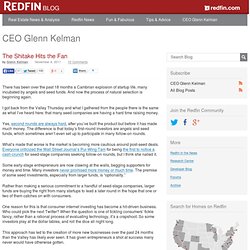
And now the process of natural selection is beginning again. I got back from the Valley Thursday and what I gathered from the people there is the same as what I’ve heard here: that many seed companies are having a hard time raising money. Yes, second rounds are always hard, after you’ve built the product but before it has made much money. The difference is that today’s first-round investors are angels and seed funds, which sometimes aren’t even set up to participate in many follow-on rounds.
What’s made that worse is the market is becoming more cautious around post-seed deals. Some early-stage entrepreneurs are now clawing at the walls, begging supporters for money and time. One reason for this is that consumer internet investing has become a hit-driven business. And some don’t need any more capital or advice beyond a seed round of financing. You Can't Ever Have Enough Hype Until You Have Too Much Hype.
OK, hands up, who's truly surprised by the drop in the stock markets or the postponed tech IPO's or even the upcoming slowdown in venture financing?
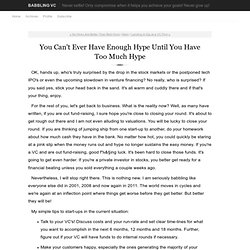
No really, who is surprised? If you said yes, stick your head back in the sand. It's all warm and cuddly there and if that's your thing, enjoy. For the rest of you, let's get back to business. What is the reality now? Nevertheless, I will stop right there. My simple tips to start-ups in the current situation: Talk to your VC's! Regardless of the markets, your best bet is to continue being awesome based on your products and not because of market hype. Winter is coming. It doesn't matter if you call it a boom or a bubble.
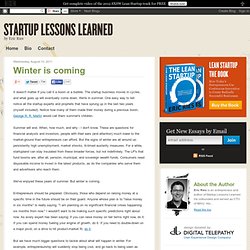
The startup business moves in cycles, and what goes up will eventually come down. We're in summer. One easy way to tell: notice all the startup experts and prophets that have sprung up in the last two years (myself included). Notice how many of them made their money during a previous boom. George R. Why to Start a Startup in a Bad Economy. October 2008 The economic situation is apparently so grim that some experts fear we may be in for a stretch as bad as the mid seventies.
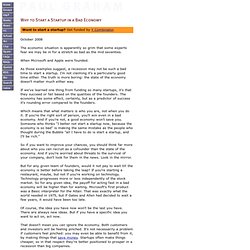
When Microsoft and Apple were founded. As those examples suggest, a recession may not be such a bad time to start a startup. I'm not claiming it's a particularly good time either. The truth is more boring: the state of the economy doesn't matter much either way. If we've learned one thing from funding so many startups, it's that they succeed or fail based on the qualities of the founders. Which means that what matters is who you are, not when you do it. So if you want to improve your chances, you should think far more about who you can recruit as a cofounder than the state of the economy. But for any given team of founders, would it not pay to wait till the economy is better before taking the leap?
Cdixon: Far more important than te... The Case for the Fat Startup. [This blog post was originally published on All Things Digital on March 17, 2010.]
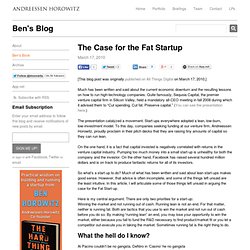
Much has been written and said about the current economic downturn and the resulting lessons on how to run high-technology companies. Quite famously, Sequoia Capital, the premier venture capital firm in Silicon Valley, held a mandatory all-CEO meeting in fall 2008 during which it advised them to “Cut spending. Cut fat. Preserve capital.” (You can see the presentation here.) The presentation catalyzed a movement. On the one hand, it is a fact that capital invested is negatively correlated with returns in the venture capital industry. So what’s a start-up to do? Here is my central argument. What the hell do I know? Al Pacino couldn’t be no gangsta, DeNiro in ‘Casino’ he no gangstaWanna be, wanna see, wan’ get a shoveldig Tookie up n*&%^! At this point, some of you are asking yourselves, “What the hell does Ben know?
Stock Market Drops. Then It Rallies. What Happens Next for Funding? This article was originally published on TechCrunch.
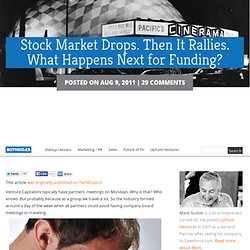
Venture Capitalists typically have partners’ meetings on Mondays. Why is that? Who knows. Double Dipping - Continuations. Double Dipping What happened in yesterday’s market underlines the deep bind we now find ourselves in.
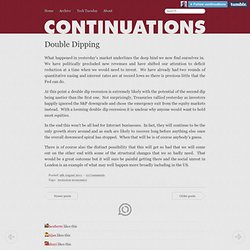
We have politically precluded new revenues and have shifted our attention to deficit reduction at a time when we would need to invest. We have already had two rounds of quantitative easing and interest rates are at record lows so there is precious little that the Fed can do. At this point a double dip recession is extremely likely with the potential of the second dip being nastier than the first one. Not surprisingly, Treasuries rallied yesterday as investors happily ignored the S&P downgrade and chose the emergency exit from the equity markets instead. In the end this won’t be all bad for Internet businesses.